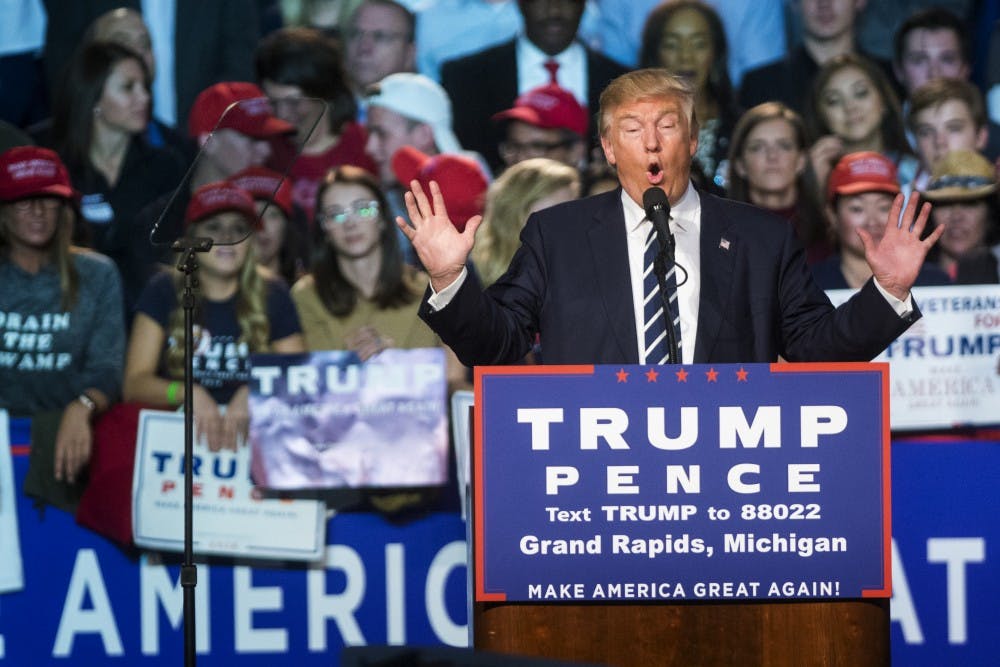Nearly seven years after delivering yearly incessant promises to repeal the Affordable Care Act in campaign after campaign, the Republican Party failed to surface a vote on the American Health Care Act, or AHCA.
After bloviating about his abilities to ensure deals and win throughout a contentious 2016 election and instilling a profound belief in those who voted him that he would deliver yet another victory, this time on healthcare, President Donald Trump suffered a major loss.
The Republican Party was short of the 216 votes it needed to deliver a new healthcare plan with holdouts from within its own party and no votes from the Democrats.
Speaker of the House Paul Ryan, who long championed a solution to Obamacare, pulled the bill and could not divulge any plan going forward in regards to healthcare, calling Obamacare the law of the land.
“Moving from an opposition party to a governing party comes with growing pains,” Ryan said in televised press conference following the pulling of the bill. “We’re feeling those growing pains today.”
Trump, in a broadcasted press conference from the Oval Office, said the plan going forward was to wait and watch Obamacare explode. No prominent Republicans could foresee a plan on healthcare in the near future. The now defunct bill, however, could serve as the basis for a revised bill in the future.
The details of the now in-limbo AHCA might be unfamiliar to many members of the MSU community. The bill’s provisions would have possible effects on those whose health care comes from the individual market or from the Medicaid program.
According to a Congressional Budget Office Study, at a savings of $337 billion, 14 million Americans would have had healthcare coverage in 2018 under the new plan. By 2020, 21 million fewer citizens would have been insured under the American Health Care Act than under the Affordable Care Act.
According to the study, the immediate change in covered population would be driven by the repeal of the individual mandate, which requires citizens to sign up for health insurance or face a penalty. Young, healthy Americans would be those most likely to drop out of the insurance market without the penalties, meaning the older Americans left in the market would face higher premiums, thus driving some of them out of the market as well.
MSU professor Leonard Fleck, who opposes the American Health Care Act, says the law will lead to what he calls “politically assisted suicide."
“In some cases, individuals will deny themselves access to timely, needed healthcare for what are the early stages of a serious, chronic illness, such as cancer," Fleck said. "And then the result is that they’re forced into the healthcare system by advanced cancer, which is not curable, and the result is that they die prematurely. And that’s what I’m referring to when I talk about politically assisted suicide that’s encouraged by the (American Health Care Act).”
In the long term, Medicaid, the federal healthcare program for disadvantaged individuals, could also be affected by the new healthcare bill, as it could put Affordable Care Act expansions to Medicaid in jeopardy. Michigan's Healthy Michigan program is one example of such a Medicaid expansion program; its provisions allow individuals making less than 133 percent of the poverty line who would not otherwise be covered by Medicare to get coverage, according to the program's official website.
MSU economics professor John Goddeeris said Medicaid expansions that were originally funded by the federal government, but are now funded in part by states as well, would soon require far more state funding to operate.
“Asking the states to pick up that much more of the cost, it’s likely that they couldn’t maintain the expansion in the same way that they’re doing now,” Goddeeris said.
Michigan Gov. Rick Snyder said earlier this week that the Healthy Michigan Medicaid expansion would be unlikely to survive the passing of the American Health Care Act, according to MLive. Michigan Department of Health and Human Services Communications Officer Bob Wheaton said his organization, along with Snyder, has offered the Healthy Michigan program to the federal government as a “model” health care program.
“It’s still relatively early in the legislative process in Washington,” Wheaton said in an email. “Healthy Michigan Plan has been a great success and it’s something that we would like to continue, so that’s why we’re working with Congress and the Trump administration to preserve the Healthy Michigan Plan.”
Even if a revised AHCA is put into place, there is no guarantee that it will be the long-term health care solution, especially if Democrats win power back in a future election. Goddeeris said major insurance companies, focused on providing coverage through employers and supplementing Medicare coverage, could be wary of the individual market if its rules continue to be volatile.
“This is a relatively small market, this market where people are providing individual coverage,” Goddeeris said. “And you have seen, in the last couple years, some major insurers dropping out of it ... And if you are changing the rules frequently, that obviously makes things harder for the insurance companies. So they’re not going to walk away entirely from providing health insurance, but if there continues to be so much insecurity, it makes it more likely that some insurers will be willing to say, let’s get out of this particular market.”
Support student media!
Please consider donating to The State News and help fund the future of journalism.
Discussion
Share and discuss “As healthcare bill is pulled, here's what it could have meant ” on social media.







